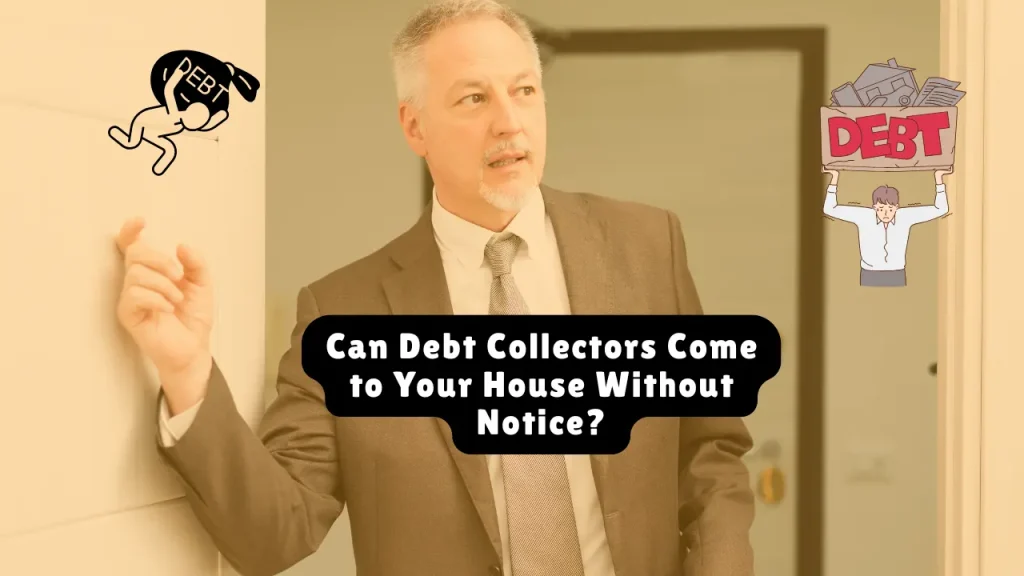Can Debt Collectors Come to Your House Without Notice?
Yes, debt collectors can legally visit your home without prior notice in most U.S. states—but they must follow strict federal and state regulations. Understanding your rights under the Fair Debt Collection Practices Act (FDCPA) and state laws is key to protecting yourself from harassment, privacy violations, and intimidation tactics. Here’s what you need to know.
Table of Contents
Legal Angal: Yes, Visits Are Allowed—But With Boundaries
A. Federal Law: Fair Debt Collection Practices Act (FDCPA)
- Permissible Hours: 8 a.m. to 9 p.m. local time
- No Prior Notice Required: Collectors may appear unannounced
- Identification Required: Must disclose identity and purpose of visit
- Harassment Prohibited: No threats, intimidation, or abusive behavior
- Right to Revoke Visits: You may revoke in-person contact rights verbally or in writing. Violations can trigger $1,000+ fines
B. State-Level Enhancements
- California (Rosenthal Act): Protects against original creditor abuse and imposes higher standards of conduct. Violators may be fined or sued for trespass or harassment.
- Texas: Threats of wage garnishment or homestead seizure are illegal. Harassment can result in criminal charges.
- Oregon: $200 minimum damages for unlawful behavior; restrictions on workplace contact.
- Florida: No seizure of homesteads; limited wage garnishment.
- New York: Tightens rules on public behavior and frequency of visits.
What Collectors Can and Cannot Do
Permitted Actions:
- Knock or ring the doorbell between 8 a.m. and 9 p.m.
- Identify themselves as debt collectors
- Request to speak about a specific debt (no obligation to engage)
Prohibited Actions:
- Entering your home without consent
- Seizing property without a court order
- Impersonating law enforcement or legal authorities
- Disclosing debt to neighbors or posting notices on your property
- Ignoring your request to stop visits
Related article: What Time Can Debt Collectors Visit Your Home?
How to Respond to an Unexpected Visit
A. During the Visit
- Do not open the door
- Ask for identification: Collector’s name, agency, license number
- Demand written proof: Debt validation must be mailed within 5 days
- Record the encounter (legal in 38 states)
B. After the Visit
- Send a Cease Visit Letter via certified mail
Sample: “Per FDCPA §805, cease all in-person visits. Contact me only via mail.” - Dispute the debt: Request verification of ownership, balance, and statute of limitations status
- Report violations:
- CFPB (Consumer Financial Protection Bureau)
- FTC (Federal Trade Commission)
- State Attorney General
- Local police if trespassing occurred
Exceptions: Who Has Legal Right to Visit
| Visitor Type | Legal Authority | Your Rights |
| Bailiffs/Enforcement | Can seize assets only with a court judgment | Must provide 7–10 days’ notice |
| Process Servers | Deliver legal papers (lawsuit notifications, etc.) | Accept to avoid default judgment |
| Law Enforcement | Execute seizures post-judgment | Must show warrant; claim legal exemptions |
Proactive Strategies to Prevent Home Visits
- Negotiate debts early: 70% of creditors accept payment plans before accounts go to collections
- Limit communication: Request mail-only contact to reduce home visits
- Cease letters for time-barred debts: For debts older than 4 years (varies by state)
- Monitor credit: Dispute unverified collections via AnnualCreditReport.com
Related article: How to Respond to Debt Collection Summons in Washington State?

Legal Remedies & Enforcement Options
- Cease and Desist Letter: Stops all further communication if sent in writing
- FDCPA Violation Compensation:
- Up to $1,000 statutory damages per violation
- Legal fees and emotional distress damages
- Suing Collectors: File small claims or civil suit for repeated or severe violations
- Use Legal Aid Services:
- Upsolve.org
- National Association of Consumer Advocates (naca.net)
- State Legal Aid organizations
Emotional & Safety Tips
- Rehearse what to say before they arrive
- Have someone nearby via phone or in-person during the visit
- Avoid opening the door or discussing financial details
- Consider security systems or doorbell cameras to document interactions
FAQs
Can debt collectors come after 9 p.m.?
No. That violates FDCPA and state laws
What if they claim to be law enforcement?
Illegal. File a police report for impersonation
Can they talk to neighbors?
Only to confirm your location, not disclose debt details
Does one visit equal harassment?
Not automatically, but multiple visits or aggressive conduct may qualify
Final Takeaway
Yes, debt collectors can legally visit your house—but only within strict legal limits. When they overstep, you have multiple defense tools: cease letters, documentation, complaints, and even lawsuits. Stand your ground, assert your rights, and never feel forced to engage.
“Debt collectors win through intimidation—your rights are your shield.” — FTC Debt Collection Guidelines
Resources:
- Consumer Financial Protection Bureau
- National Association of Consumer Advocates
- AnnualCreditReport.com
About the Author

Sarah Klein, JD, is a former consumer rights attorney who spent years helping clients with issues like unfair billing, product disputes, and debt collection practices. At All About Lawyer, she simplifies consumer protection laws so readers can defend their rights and resolve problems with confidence.
Read more about Sarah
